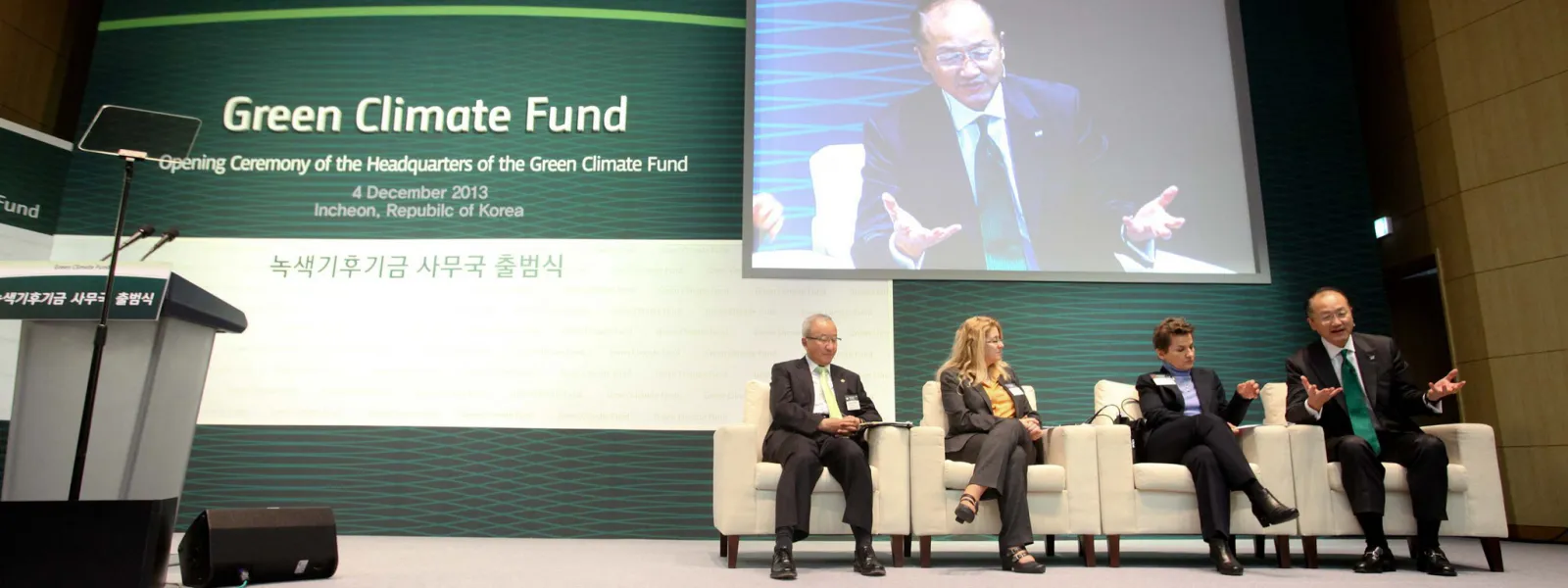
Project
Photo: GCFAdvocating before the Green Climate Fund
The Green Climate Fund is the world's leading multilateral climate finance institution. As such, it has a key role in channelling economic resources from developed to developing nations for projects focused on mitigation and adaptation in the face of the climate crisis.
Created in 2010, within the framework of the United Nations, the fund supports a broad range of projects ranging from renewable energy and low-emissions transportation projects to the relocation of communities affected by rising seas and support to small farmers affected by drought. The assistance it provides is vital so that individuals and communities in Latin America, and other vulnerable regions, can mitigate greenhouse gas emissions and address the increasingly devastating impacts of global warming.
Climate finance provided by the Green Climate Fund is critical to ensure the transformation of current economic and energy systems towards the resilient, low-emission systems that the planet urgently needs. To enable a just transition, it’s critical to follow-up on and monitor its operations, ensuring that the Fund effectively fulfills its role and benefits the people and communities most vulnerable to climate change.
Reports
Read our recent report "Leading participatory monitoring processes through a gender justice lens for Green Climate Fund financed projects" here.
Partners:
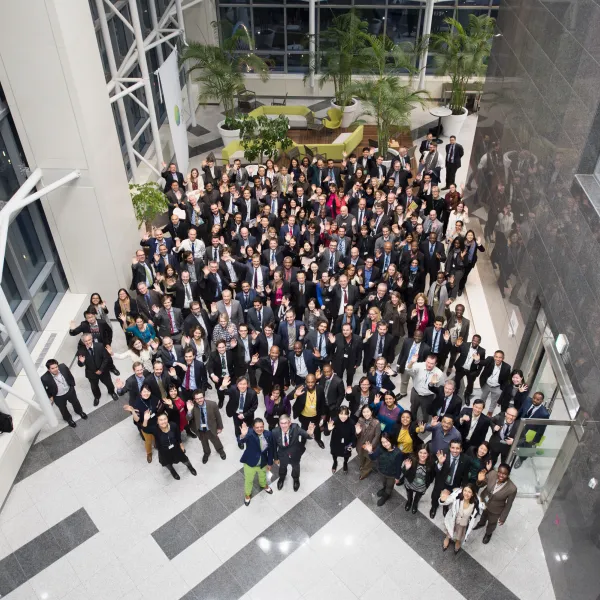
Related projects
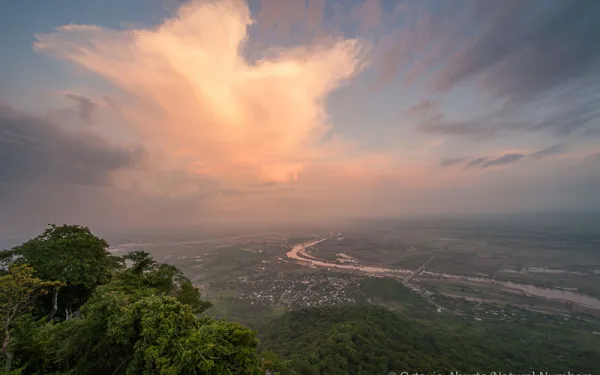
Worth Protecting: Mexico’s Marismas Nacionales
By Anna Miller, AIDA writer On Mexico’s northern Pacific coast, verdant mangroves reach their roots into the shallow soil, drink up the sweet, fresh water flowing from the mountains, and shelter the diverse, abundant life teeming below. Crabs crawl along the muddy ground, fish zig and zag along the root systems, crocodiles wait patiently in the shallows, and sea turtles feed on their way to coastal nesting grounds. This living, breathing community, extending 2,000 square kilometers through Nayarit and Sinaloa states, is the largest mangrove forest on Mexico’s Pacific coast. Despite the importance of this rich environment, the Marismas Nacionales are at risk. Their health and vitality are threatened by the proposed Las Cruces hydropower project, which would dam the Río San Pedro Mezquital, the last free-flowing river in the Sierra Madre Mountains. After the senseless destruction of the Tajamar mangroves in Cancún, Mexico must now, more than ever, live up to its responsibility to preserve vital wetlands like Marismas Nacionales. There is so much worth protecting. The San Pedro Mezquital River is born in the highest peaks of the Sierra Madre, flowing through dense green forests and across valleys before reaching the coastal plains of Nayarit, where its fresh waters feed Marismas Nacionales. Altering the natural flow of the river would increase sedimentation in the wetlands and risk suffocating the sensitive system. The vast coastal wetlands along the Gulf of California are home to as many as 20 percent of Mexico’s mangroves. A sort of biological super system harbors a diverse array fish and birds and insects and amphibians. The Marismas Nacionales are believed to constitute one of the most productive environments in Northwest Mexico. Coastal communities also live in harmony with Marismas Nacionales and depend upon the wetlands for their survival. The coastal marine environment provides a sustainable livelihood for local populations, who fish and harvest shellfish. The communities are therefore linked with the health and wellbeing of the wetlands. An avian paradise, the Marismas Nacionales are home to more than 250 species of birds, nearly half of which are migratory. The Marismas provide a critical wintering habitat for birds from the Pacific coastal region: in parts of the year, 80 percent of Pacific migratory shorebirds take shelter there. Many local species also seek out the mangroves as shelter from surrounding areas during particularly harsh weather. Without a healthy river, the life in these vast mangrove forests and coastal lagoons may be lost for good. With the construction of Las Cruces Dam, Mexico is putting at risk another of its sacred natural places. AIDA is committed to protecting Marismas Nacionales, and the health and way of life of all the living things that depend on them. We hope you’re with us. Learn about our work to stop Las Cruces Dam
Read more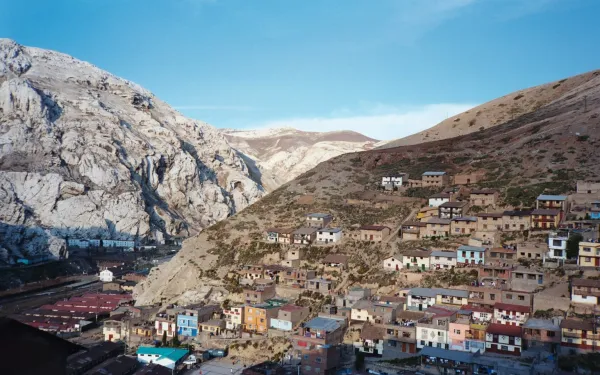
My first visit to La Oroya
By Rodrigo da Costa Sales, AIDA attorney “What do you think of La Oroya?” a local resident asked me the first time we met. Honestly, I wasn’t quite sure how to respond. Quickly sensing my discomfort, he joked, “It’s very beautiful, there’s so much biodiversity, and the sky is so blue...” Relieved, I laughed along with him and, since that moment, I’ve been searching for the words to describe La Oroya. La Oroya is a city of 33,000 people on the Mantaro River in central Peru, at an altitude of nearly 5,000 meters. This was my first time there, and I stayed only two days. The trip from Lima takes five hours, winding along painfully curvy roads with breathtaking views of the mountains all around. In La Oroya, however, the landscape changes drastically. The city is covered in a sheet of grey, with little to no natural life, streets full of trucks transporting iron and other heavy metals... and not much else of note. My greatest wish for my time in La Oroya was to meet the people we are representing in our case before the Inter-American Commission on Human Rights. After working on it for six months, I wanted finally to put faces to the names I had come to know so well on paper. Our meeting was scheduled for the evening, when residents could find time free from work and family commitments. There, we introduced them to students from Yale University, who were developing an important report on the relationship between La Oroya’s air quality and the health of city residents. Although interested in the study, and happy to hear about it, residents quickly peppered us with questions about the case. The main thing they wanted to know—an answer they have been waiting for since our petition was filed seven years ago—was when the Commission will make its decision. They explained the many offensive comments they’ve had to endure, both from workers at the metal-smelting complex and from their own neighbors, during the long wait for a ruling. They’ve suffered threats from fellow residents of La Oroya, who wrongfully believe that the purpose of the case is to close the complex, which would leave many people without jobs. In one especially disturbing instance, a “doctor” spoke on television claiming that lead contamination does not cause any health problems. He claimed the residents of La Oroya as proof that, while contaminated by lead and other heavy metals, people could still lead normal lives. We reminded them that a process before an international organism involves years of waiting, and that we sympathized with them for everything they had been through in the past few years. But the truth is that I felt such intense frustration. It was the first time that I saw, up close, such personal desire for an international decision. I understood then that a decision on paper could actually constitute a form of reparation. The long-awaited Commission report will show the world that the effects of heavy-metal pollution on a population actually violate their personal integrity and right to health. The goal of this case is not to close the metallurgical complex, but instead to force the adoption of measures that guarantee a certain quality of life for the residents of La Oroya. The Commission’s report will be the instrument in this case by which international and human rights law becomes real, effective and transformative. I returned from La Oroya almost a week ago, and I’m still searching for the words to describe such a place. Truthfully, La Oroya didn’t seem very nice at first. But I quickly came to realize that the beauty of a place comes not only from its natural and man-made attractions; it comes also, and perhaps more importantly, from the beauty of its people. In that sense, I’ve never seen a city quite as beautiful as La Oroya. This blog is dedicated all the victims of the case in La Oroya. I hope that they will achieve justice, and that because of them, a case like this is never repeated around the world. It is also dedicated to Astrid Puentes and Maria José, AIDA’s attorneys in charge of the La Oroya case, who inspire me daily to work for a more just world.
Read more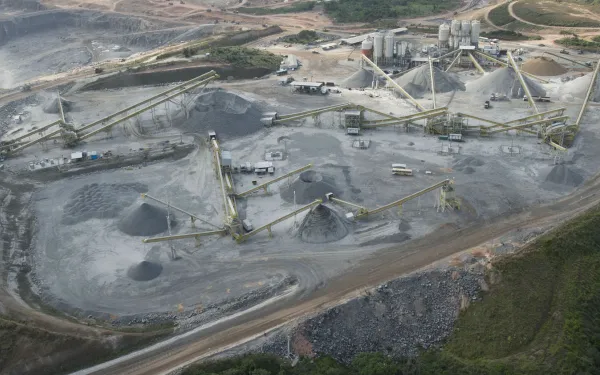
Brazilian Court overturns suspension of Belo Monte’s operating license
Brasilia, Brazil. The Federal Regional Court of the First Region (TRF1) overturned the preliminary decision suspending the operating license of the Belo Monte Dam. On January 11, the Federal Justice of Altamira decided to suspend the license until the federal government and Norte Energia, the company in charge of the dam’s construction, complied with their obligation to restructure the National Indian Foundation (FUNAI) of Altamira. However, a federal judge from TRF1 decided today that this decision disproportionately “affects the public interest, causing grave repercussions on the economy and public order.” Another argument presented was that the suspension would prevent the implementation of various plans designed to benefit indigenous peoples. “This is yet another attack on the rights of the affected indigenous communities. The decision manipulates the arguments of public interest, order, security and the economy, and then uses the plans – which should have been implemented when the previous license was granted in 2010 – to justify why it is not possible to suspend the operating license. The bottom line is that the operating license never should have been granted in the first place without the fulfillment of those plans,” said María José Veramendi, AIDA attorney. For more information, please consult the factual record of the case and the latest news about our case before the IACHR.
Read more